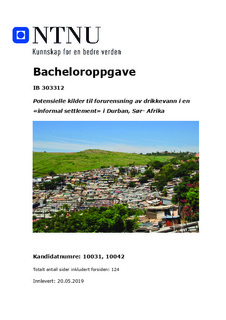Potensielle kilder til forurensning av drikkevann i en «informal settlement» i Durban, Sør-Afrika
Abstract
Målet med denne studien var å undersøke den mikrobielle drikkevannskvaliteten og vurdere de sanitære forholdene i en slumbosetting. Bosettingen som ble valgt for feltarbeidet var Kennedy Road Settlement, som ligger i Durban, Sør-Afrika. De primære delmålene var å finne kilden til eventuell forurensning og undersøke hvordan fekal forurensning kan forflyttes fra kilde til drikkevann.
Observasjonene våre avdekket at området var nokså preget av dårlige sanitære forhold, med «community ablution blocks» som unntaket. En utfordring så ut til å være at noen av innbyggere benyttet forfallende og avskaffede latriner, fremfor å benytte «community ablution blocks» som sanitær fasilitet. Dette kan skyldes tilgjengelighet og adkomst.
Vannprøver ble samlet inn fra tre kommunale forsyningskraner, ni «community ablution blocks», 16 ulovlig oppsatte vannkraner og 87 husstanders lagringsenheter. Disse ble analysert for indikatororganismene E. coli og koliforme bakterier. Resultatene viste ingen funn av E. coli og koliforme bakterier i prøver fra «community ablution blocks» og vannkranene, både lovlige og ulovlige. Den mikrobielle forurensningen som ble funnet, ble påvist i husstandslagret drikkevann. Det var funn av koliforme bakterier i 39 av 87 husstander, og i syv av disse var det også funn av E. coli. Metoden «polymerase chain reaction» (PCR) ble brukt for kildesporingen av de positive prøvene. Kildesporingen testet for markører spesifikke for menneske, hund, fjærkre, kveg og gris. Resultatene avslørte at 31% av sporet forurensning stammet fra mennesker.
Vannet som forsyner Kennedy Road Settlement kommer fra Umgeni Water vannbehandling, som også forsyner store deler av Durban sitt metropolske område. De mikrobielle analysene gir grunn til å tro at kvaliteten på distribuert vann er tilstrekkelig. Den konsentrerte forurensningen i husstandene antyder en sterk relasjon mellom de sanitære forholdene og drikkevannskvaliteten. Anbefalinger for videre arbeid er å investere i forbedring av den sanitære infrastrukturen i Kennedy Road. Tiltak rettet mot de sanitære forholdene vil kunne være helsefremmende ved at fekal forurensning hindres i å nå drikkevannet. Dette vil kreve videre kartlegging av området og forholdene for å kunne avgjøre hva slags løsning som gir størst gevinst The aim of this study was to determine the microbial quality of the drinking water and assess the sanitary conditions in an informal settlement. The informal settlement chosen for this fieldwork was the Kennedy Road Settlement, located in Durban, South-Africa. The objectives were to find the source of contamination and consider the microbial pathways of the faecal contamination, from source to new host.
Observations revealed that the area had quite poor sanitary conditions, with the community ablution blocks as the exception. An issue seemed to be that some preferred using outdated and decommissioned latrines rather than the community ablution blocks as a sanitary facility, because of availability and proximity.
Water samples collected from 3 communal supply taps, 9 community ablution blocks, 16 local handcrafted taps and water from 87 household storage containers, were analyzed for the indicator organisms E. coli and total coliforms. Results showed no detection of E. coli or total coliforms in the samples from community ablution blocks and supply taps, both legal and illegal connections. The microbial contamination that was found, was detected in household storage containers. There were findings of total coliforms in 39 of 87 sampled households, and in 7 of these samples there were also detections of E. coli. The polymerase chain reaction method (PCR) was used for source tracking the positive samples. The source tracking was conducted for the markers specific to humans, dogs, poultry, cattle and pigs. Results revealed that 31% of the tracked contamination derived from humans.
The water supply that reaches Kennedy Road Informal Settlement originates from the Umgeni Water, which also serves larger parts of Durban’s metropolitan area. The microbial analyses give reason to believe that the quality of the distributed water is sufficient. Contamination concentrated in the household storages suggests a strong link between the sanitary conditions and practices, and the drinking water quality. Recommendations for further action is to invest in improving the sanitary infrastructure in Kennedy Road, as this can pose as a health-improving measure by preventing faecal contamination of the drinking water. Further assessment of the conditions in the area is needed to make a specific solution to the problems.
